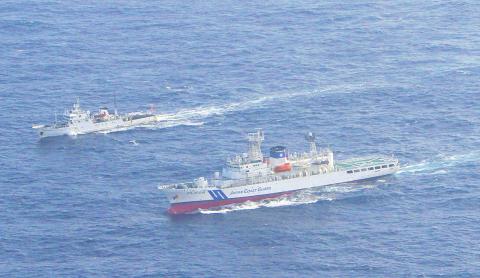China told Japan yesterday to respect its “indisputable sovereignty” over islands claimed by both countries in the East China Sea, in the latest territorial row between Beijing and its neighbors.
Chinese Foreign Minister Yang Jiechi (楊潔篪) met Japanese counterpart Koichiro Gemba in Phnom Penh where he “reaffirmed China’s principled position” on the islands known as Senkaku in Japanese and Diaoyutai (釣魚台) in Chinese, and are also claimed by Taiwan.
“He stressed that Diaoyu Islands and their affiliated islets have always been China’s territory since ancient times, over which China has indisputable sovereignty,” a statement from the Chinese delegation said.

Photo: Reuters
Japan summoned the Chinese ambassador in Tokyo as three Chinese patrol boats approached the chain of islands, which are privately held by Japanese owners.
The crew of the Chinese vessels, which have since left the islands’ immediate vicinity, initially rebuffed Japanese orders to leave, Japanese officials said.
“We are conducting official duty in Chinese waters. Do not interfere. Leave China’s territorial waters,” the Chinese crew said, according to the Japan Coast Guard.
The waters around the disputed islands have been the scene of previous rows, including the arrest of a Chinese trawlerman in late 2010.
Yesterday’s spat is the latest clash over disputed territory between China and its neighbors that threatens to overshadow attempts to smooth regional relations at an Asian security summit in Cambodia this week.
ASEAN’s 10 member countries have been trying to agree a long-stalled “code of conduct” for the South China Sea that would help settle overlapping claims in the resource-rich waterway.
The Philippines is leading a push for ASEAN to unite to persuade China to accept a code based on a UN law on maritime boundaries that would delineate the areas belonging to each country.
Manila also wants ASEAN to condemn a standoff last month between Philippine and Chinese ships over the Scarborough Shoal (Huangyan Island, 黃岩島) and also claimed by Taiwan, an outcrop in the South China Sea.
Yang urged Japan to adhere to agreements and understandings with China “in good faith” and said it should return to “the right path of managing differences through dialogue and consultation with the Chinese side.”
China’s assertiveness over disputed territories in the South China Sea, which is home to vital shipping lanes, is seen by analysts as pushing anxious neighboring countries closer to the US.
Beijing also recently angered Vietnam by inviting bids for exploration of oil blocks in contested waters, sparking protests in Hanoi.
US Secretary of State Hillary Rodham Clinton arrived in Cambodia yesterday to press for closer relations with ASEAN, part of Washington’s strategy of “pivoting” toward Asia to challenge China’s influence.

PREPAREDNESS: Given the difficulty of importing ammunition during wartime, the Ministry of National Defense said it would prioritize ‘coproduction’ partnerships A newly formed unit of the Marine Corps tasked with land-based security operations has recently replaced its aging, domestically produced rifles with more advanced, US-made M4A1 rifles, a source said yesterday. The unnamed source familiar with the matter said the First Security Battalion of the Marine Corps’ Air Defense and Base Guard Group has replaced its older T65K2 rifles, which have been in service since the late 1980s, with the newly received M4A1s. The source did not say exactly when the upgrade took place or how many M4A1s were issued to the battalion. The confirmation came after Chinese-language media reported

The Taiwanese passport ranked 33rd in a global listing of passports by convenience this month, rising three places from last month’s ranking, but matching its position in January last year. The Henley Passport Index, an international ranking of passports by the number of designations its holder can travel to without a visa, showed that the Taiwan passport enables holders to travel to 139 countries and territories without a visa. Singapore’s passport was ranked the most powerful with visa-free access to 192 destinations out of 227, according to the index published on Tuesday by UK-based migration investment consultancy firm Henley and Partners. Japan’s and

A Ministry of Foreign Affairs official yesterday said that a delegation that visited China for an APEC meeting did not receive any kind of treatment that downgraded Taiwan’s sovereignty. Department of International Organizations Director-General Jonathan Sun (孫儉元) said that he and a group of ministry officials visited Shenzhen, China, to attend the APEC Informal Senior Officials’ Meeting last month. The trip went “smoothly and safely” for all Taiwanese delegates, as the Chinese side arranged the trip in accordance with long-standing practices, Sun said at the ministry’s weekly briefing. The Taiwanese group did not encounter any political suppression, he said. Sun made the remarks when

BROAD AGREEMENT: The two are nearing a trade deal to reduce Taiwan’s tariff to 15% and a commitment for TSMC to build five more fabs, a ‘New York Times’ report said Taiwan and the US have reached a broad consensus on a trade deal, the Executive Yuan’s Office of Trade Negotiations said yesterday, after a report said that Washington is set to reduce Taiwan’s tariff rate to 15 percent. The New York Times on Monday reported that the two nations are nearing a trade deal to reduce Taiwan’s tariff rate to 15 percent and commit Taiwan Semiconductor Manufacturing Co (TSMC, 台積電) to building at least five more facilities in the US. “The agreement, which has been under negotiation for months, is being legally scrubbed and could be announced this month,” the paper said,